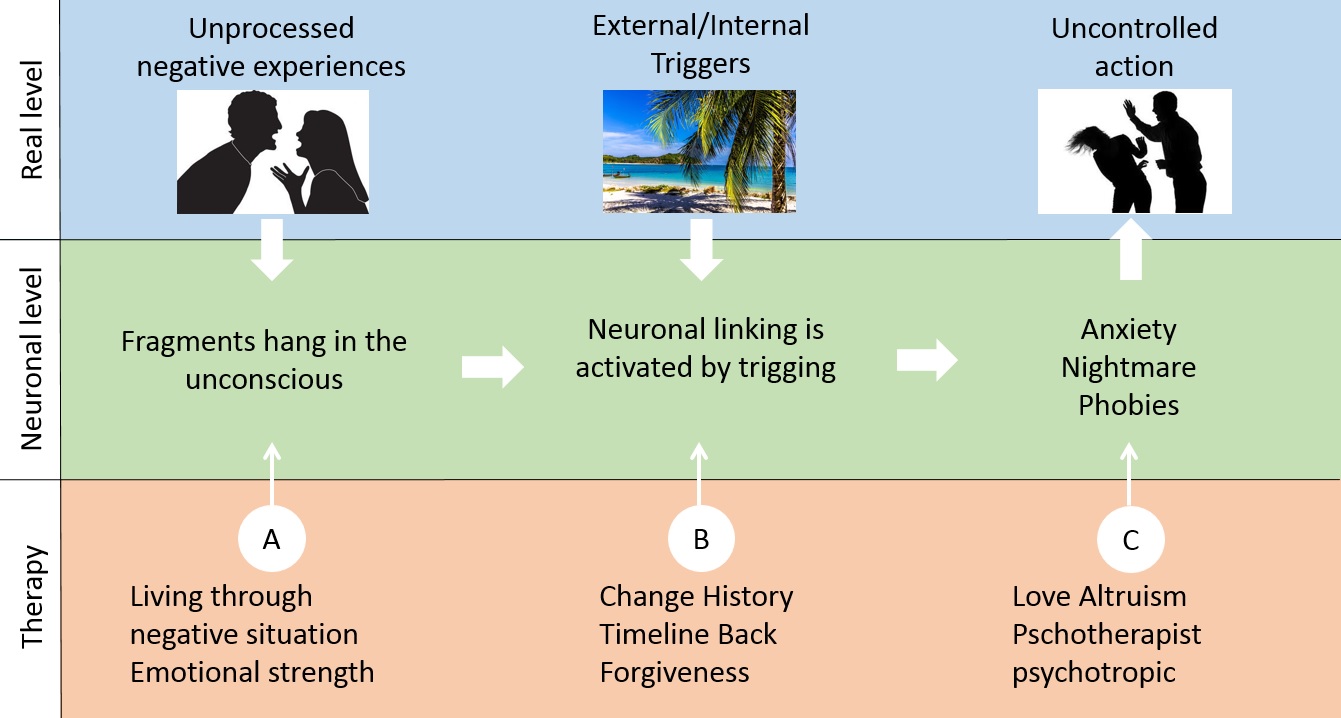Black Mirror 3.2. Playtest
The shadow of the soul
This episode was supposed to be about a game test. This is just the obvious story of something very deep. In fact, these are repressed experiences, usually of a negative nature. Something like this has happened to us many times before. We are in a situation that is very stressful for us. Basically, people can handle it, even when relationships diverge and worse when it comes to deaths. If such situations are not completely processed mentally, fragments remain stored in the brain. Very often these are called “shadows of the soul”.
Mister Cooper the lead actor is obviously a cool guy who is hardly an adventure too dangerous. He is on a world tour and is typical for him on the dangerous action sites like Bunge Jumping, Free Climbing, Air diving, Pamplona Bull Run etc. Interestingly, the reason for this action trip is not his need for extraordinary experiences, but his problems at home he wants to get rid of it. Cooper has long been caring for his alzheimer’s diseased father, who recently passed away. He has a very bad relationship with his mother for unknown reasons. In the episode, the scene in which his mother calls and he does not pick up appears again and again. Apparently he cannot even talk to her. Something very serious should have happened, which was never finalized between these two was therefore left open. Ultimately, relationship issues with women are likely to be associated with this problem complex. It could be said that there are several shadows in his soul that are not processed experiences.
The relationship problem shows up in an episode in London, where he once again finds himself completely alone and at least looking for a conversation partner. He does not find anyone in his contacts. However, in a bar he meets an attractive woman named Sonja. He spends one night with her and wants to travel on. When he wants to withdraw money from the ATM, his card is blocked because he is hopelessly in debt. He has no choice but to work. Back at Sonja’s, he finds a newspaper ad looking for adventurous men to test cyber games.
We don’t know that much about Sonja except that she herself is a play tester and reads the book Singularity by Ray Kurzweil. Again a mental situation that Cooper does not bring to an end. In the further course of the story it could even be that Sonja deliberately uses him.
Shortly Cooper reports to SaitoGames and gets the job. The company is programming “interactive augmented reality” games. The main thing is to trigger fears in the player. The producers claim that: “You can expose your biggest fears in a secure environment. This reduces anxiety and this release leads to mental liberation “. In conventional adventure games it was always “kick”. Scenes were programmed in which one was attacked by gruesome beings, fell into black holes or experienced telekinesis. These constructions certainly cause anxiety in many people, but not all. That’s why the company SaitoGames relies on a completely new technological concept. By means of a neuronal derivative brain activity is measured in the subject. It is now found out which images and situations trigger the greatest individual horror. The game is very individualized. The game developer: “How to scare someone with their own mind”.
After all administrative activities are completed, Cooper is led into an old house. The building itself has nothing ghostlike. It’s just an empty English mansion. With the instructor Cathy a security word is agreed, which Cooper only needs to pronounce and can be fetched from the simulation. At this time, he still has a great security and his behavior is determined by “superficial cheerfulness”. The different levels of this individualized game are generated exclusively in the subject’s brain and last only 0.04 seconds. The game producer does not know what the user is experiencing, so Cathy is connected to Cooper via a headset and has the task of describing his experience. Now the journey begins:
- Just nothing:
Game psychologists have recognized: “That with little stimulation the mind plays a joke on you. If there is no distraction, people see ghosts. ” Cooper is now in this house, completely alone and without a cell phone. All sorts of thoughts come to him. This is what most people know, for example, when traveling in semi-darkness or in a foggy environment, you suddenly see all sorts of impossible and impossible figures.
- A spider:
The first thing Cooper constructs in his mind is a simple spider. It could be that he, who is not afraid of anything, is still afraid of a spider. Spiders are afraid of many people. You cannot tell where that comes from. It’s obviously something archetypal. Cathy discovers he has an increased heart rate and states “So tough guy is so afraid of spiders”.
- An old school friend:
The sensual deprivation awakens his memories, among others, to his school friend Joseph Peters. He gets to know him from his schooldays and is very frightened. Again, we see an unprocessed mental fragment, although Peters is just a visual simulation, he begins an intense dialogue. “People talk more when they are afraid and compensate for it”.
- A giant spider:
That with the spiders should already be a serious problem of Cooper. He now sees a larger than life spider with the face of Peters. This leads to panic-like reactions. He calls Cathy for help. The communication is interrupted, however. Probably deliberately to increase his anxiety in addition.
- Sonja:
Now Cooper starts thinking about why he got into this situation. He concludes that Sonja is responsible for that. He suspects that she sent him the ad that she hacked his VISA card and is actually part of the SaitoGames Company. These thoughts develop into states of anxiety and Sonja appears in a visual context. At this point, a major break happens, in that Sonja is present not only visually but tactilely. He can no longer distinguish between reality and visuality.
- The door:
Now informs his instructor Cathy. In desperation, he begs her to free him from the situation. Cathy gives him instructions to go to an exit point and this is behind a door. He just needed to open the door and he would be free. Cooper fears that his mother is behind this door, which makes it almost impossible for him to get in, so afraid of her.
- The mother:
After all, in this room he comes to his mother. He sees her sitting on a bed. There she tries to call him constantly to tell him something. Obviously, she also got Alzheimer’s. Mentally she is dead. Cooper cannot remember much of anything and comes into his greatest state of anxiety, where he also believes he has Alzheimer’s.
Psychotherapists know these so-called “shadows in the soul”. In the field of psychologists, there are other terms such as phobia, claustrophobia, retreat, etc. In order to use appropriate therapeutic measures, it is important to know about the emergence of such shadows.

Shadows arise in the interplay between the real and the neural world. Unprocessed negative experiences memorize and remain as a fragment in the subconscious. For example, the one could be a heated argument with the partner who is not worked up, but followed by a “silent movie”. The dispute has settled again. Actually, everything would be alright again. At the real level, triggers could now be created in the form of images and situations that re-activate this fragmented neural link – the trigger. In this example, it can be a holiday situation where a very harmonious couple is seen and experienced. Such a trigger could then lead to completely uncontrolled action. Aggressiveness against the partner can degenerate up to daily attacks.
The just described chain on the real level has no traceable logic. It is difficult now, which are the unprocessed experiences, which are the triggers (internal or external) and how uncontrolled action arises. At the neuronal level, unconscious fragments remain attached which are then activated with a trigger, which then causes anxiety, nightmares and phobias.
If a person has a tendency to not process emotional situation, there are three different therapy methods:
- Conscious living through the entire situation. So do not run away, start a “silent movie” or retire. Yes, that is difficult, but it can be practiced and learned. If you get help from your environment, it’s easier. That’s the profile.
- Once fragmented negative emotions have settled, they are more difficult to eliminate. With the timeline methodology you can mentally revert to the original situation and relive it. Probably one has more resources to solve the problem with a spatial and temporal distance. It is probably very helpful to forgive the bad behavior at the time.
- If this phobic behavior is very advanced, it needs the help of a psychotherapist. In the worst case psychotropic drugs are used. You then have to deal with a sick person. It needs a lot of love and altruism.
Most analysts see the wasted time in the first half hour of this episode because they want to see the effects of the “play tester”. The really impressive thing is just the history of Cooper and the working out of his shadows in the soul, which are then activated by triggers.




 Deutsch
Deutsch English
English